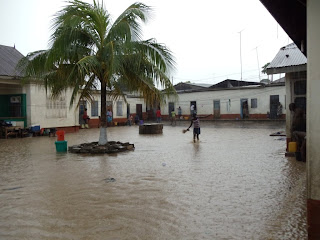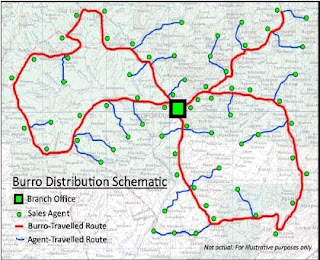It’s wonderful having a family in Ghana. I feel so welcome in Tim and Shika’s home and they have become cherished friends. Tim is our business partner at Burro and my Scrabble Husband. He is also a successful business man (outside of Burro) with many interests and Shika is brilliant and also a talented leader in the non-profit sector, heading the Ghana office of a South African NGO. She can also cook like you wouldn’t believe.
Tim is not a cook, by any means, although we swears he “knows how”, but I can attest that he can mop a pretty mean floor, which he did at our offices in Koforidua back in the early days - before we had any employees - when he was staying up here one night a week with Whit and me. Before we got someone to sweep and mop regularly, Tim was a bit appalled by the condition of our floors and swept and mopped them one morning before his (first) shower. He said it was just for exercise, to wake up and loosen up, but I think there were ghosts of once-a-week-bathing-barbarian-oburonis from a bygone time when earlier generations of pre-Ghanaians were appalled by the hygiene and habits of an occupying (mostly male) people.

Anyway, I digress. Tim and Shika are terrific and have 5 very nice, polite, and hardworking children. If you had ever been to their house you would know that Tim mopping our floor was a reach back in time for him. He and Shika work very hard, and I’m sure have done so all their lives, but there are some chores they no longer do themselves. They expect their children to work hard as well. As part of their “training” as Shika calls it, learning to be part of a family, learning to work hard and contribute, learning to respect and care for their elders, and, I suppose, in preparation for how to someday raise children of their own, they all have chores – by American standards, lots of chores.

Of course, they live in a part of the world where clothing is still washed by hand and line dried, where a fair amount of cooking is done over coals, even in the city – because some foods just need to be cooked that way, even if you have a stove, which they have. The heat can be stifling and the air dusty, so floors are tile and are swept daily and mopped often. Food is fresh, not pre-prepared, so there are vegetables to wash and peel and dice. And there are no dishwashers.
While the training and expectations of children are not exactly the same everywhere in Ghana, these are pretty common. Children are polite and respectful everywhere I go. I can hardly take a bag from the trunk of the car without a child taking it from me and carrying it upstairs. I don’t think I’ve ever made two trips in from the car in my entire time in Ghana.

At first it felt strange, partly I suppose because the children are black and I was afraid they were helping because I was white and there was a perceived servitude thing left over from the British occupation – and likely, too, because I am a product of my society and admit to a hyper-sensitive PC white guilt - I would feel weird expecting black children in my neighborhood to carry my groceries from my car in America. But in the end, it is what kids here are expected to do for any adult regardless of color, and you know, I would love it if a child of any color helped me carry my groceries from the car in America.
So, this weekend, I went to Tim and Shika’s and they had a full weekend planned. But when I go there now, I just join in whatever they are doing. So, Friday night we went to a wake-keeping for one of Shika’s uncles who had died. She would miss the funeral on Saturday because in the morning her youngest son, Lim, was being baptized and then she had to go to her own Auntie’s funeral in her hometown of Keta, about 2 hours away. I went along to all of it. Fortunately, the Ewe are not so fussy about what you wear to pay your respects, so the fact that I didn’t have traditional funeral attire was OK. However, I did wear the same skirt most of the weekend. Thankfully, I also had one black blouse.
Lim was baptized on Saturday morning, and then on Sunday morning took his first communion. I think it was my first time sitting through a Catholic mass that wasn’t a wedding and my first time in a church service of any kind in quite a number of years. Turns out, I don’t miss it. But it was nice to be there for my “small boy”, 11-year old Lim and interesting to see how things are done here. All the parents and their first-communion kids (the entire fifth grade at the adjacent Catholic school) were dressed entirely in white. Lim was excited and nervous, and read two passages during the mass. We were all very proud of him.

With two funerals and a baptism, Tim and I only got in a couple games of Scrabble, but I won them. It seems he started playing at the (highest) Genius level on the computer. He said he was up about 60% to 40% against it (he’s about 70% against me). Then the truth came out. At the genius level, the computer comes up with about five 7-letter words in a game (50 point bonus for each one - for you non-Scrabble fans) and he couldn’t keep up. So he started using his Scrabble dictionary handheld – it has a feature where you tell it your letters and it comes back and tells you the best word with those letters. Total cheating! So, karmically, he has forgotten how to come up with his own words. Waaah-hah-hah-hah!
XO
 In Ghana, December, January, February are decidedly dry and dusty. That was easy to sort out. However, it seems to rain with a fair frequency during the other months of the year, with perhaps an exception for August. So how does one define rain-y versus just rain-ing? Well, I’ve decided that April, May, June, and July seem to be the months in which it ma
In Ghana, December, January, February are decidedly dry and dusty. That was easy to sort out. However, it seems to rain with a fair frequency during the other months of the year, with perhaps an exception for August. So how does one define rain-y versus just rain-ing? Well, I’ve decided that April, May, June, and July seem to be the months in which it ma y rain all day for more than one day in a row, and thus, must be the rainy season. At other times of the year, the rains are more Chicago-esque in their power and brevity.
y rain all day for more than one day in a row, and thus, must be the rainy season. At other times of the year, the rains are more Chicago-esque in their power and brevity. So, then 77 year old Me’ena (literally, “my mother”, the honorific for an old woman), her grandmother, waded across the already deep and angry courtyard to rescue her and carry her to safety. These days, 82 year old Me’ena is nearly deaf and shuffles along without any of the new arthritis miracle drugs available elsewhere. But she loves to laugh and does my laundry every week. She charges three times what I could pay the woman who cleans our office, but every time Precious has new flip-flops, shorts, or t-shirts and says “grandma” when I comment on them, I figure it’s the best $6.00 a week I can spend.
So, then 77 year old Me’ena (literally, “my mother”, the honorific for an old woman), her grandmother, waded across the already deep and angry courtyard to rescue her and carry her to safety. These days, 82 year old Me’ena is nearly deaf and shuffles along without any of the new arthritis miracle drugs available elsewhere. But she loves to laugh and does my laundry every week. She charges three times what I could pay the woman who cleans our office, but every time Precious has new flip-flops, shorts, or t-shirts and says “grandma” when I comment on them, I figure it’s the best $6.00 a week I can spend.








